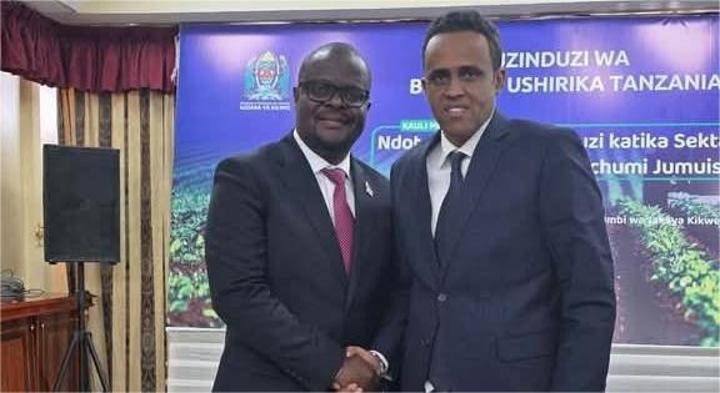Africa-Press – Malawi. From border blockades to business breakthroughs—Malawi and Tanzania have transformed their trade relationship almost overnight, thanks to a sweeping new agreement that experts are calling “the most significant economic development in the region this decade.”
The breakthrough comes amid mounting economic pressures across Southern Africa, where inflation, currency devaluation, and rising protectionism have disrupted regional trade.
Both countries face increasing pressure to improve trade efficiency, especially as global supply chains remain fragile and African economies push for deeper integration under frameworks like the African Continental Free Trade Area (AfCFTA) and the Southern African Development Community (SADC).
Tensions peaked on March 13, 2025, when Malawi unilaterally imposed an import ban on several Tanzanian goods through the Control of Goods (Import and Export) (Commerce) (Prohibition) Order. The move was aimed at protecting domestic industries and conserving scarce foreign exchange reserves, but it triggered a strong backlash from Tanzanian officials and disrupted regional supply chains.
The situation escalated further when Tanzania responded by issuing a prohibition notice on the importation of plant products from Malawi on April 23. The tit-for-tat measures rattled bilateral relations and raised concerns among traders, farmers, and regional policy analysts.
However, in a significant diplomatic shift, both nations held a Joint Ministerial Bilateral Meeting on May 2 in Dodoma, Tanzania. The high-level talks—led by Malawi’s Foreign Minister Nancy Gladys Tembo and her Tanzanian counterpart Ambassador Mahmoud Thabit Kombo—marked a turning point in the standoff.
The delegations included ministers responsible for Foreign Affairs, Trade, Agriculture, and Information from both countries. After what insiders described as “cordial and constructive discussions,” Malawi committed to issuing an Administrative Instrument to relevant authorities, effective immediately, to lift the import ban and restore the legal framework for bilateral trade. Tanzania, in turn, lifted its own ban on Malawian plant products.
“This is a win for diplomacy, regionalism, and the ordinary trader,” said a senior Malawian trade official involved in the negotiations.
The meeting also reaffirmed outcomes of the Joint Permanent Commission of Cooperation (JPCC), held earlier from February 24–27, 2025, in Lilongwe. One major goal is finalising and implementing a Simplified Trade Regime Agreement by May 30, aimed at reducing bureaucracy and streamlining trade for small-scale traders.
As a landlocked country, Malawi depends heavily on Tanzania’s Dar es Salaam port to access international markets. The import ban had severely impacted logistics chains, delaying everything from fuel to fertiliser deliveries and inflating prices back home.
Small-scale cross-border traders—especially women—bore the brunt of the disruption. Operating along key routes like Songwe, Kasumulu, and Chiponde, many reported income losses of up to 60% during the ban. For these traders, who rely on daily commerce involving goods such as textiles, maize, sugar, cement, and second-hand clothing, the resumption of trade could be life-saving.
At the heart of the dispute was Malawi’s invocation of domestic law to protect local industries. Tanzanian officials, however, argued that the order was enacted without consultation and contravened bilateral trade protocols. “Both sides recognised the need to resolve this matter in the spirit of cooperation and economic development,” read a joint communique.
The agreement includes the following key provisions:
Simplified customs procedures at major crossings such as Songwe and Chiponde.
Harmonisation of product standards and certifications to improve compliance efficiency.
Launch of a digital trade documentation platform, which will significantly cut processing times.
Establishment of a Joint Trade Committee to manage future disputes swiftly.
Special accommodations for small traders, including reduced tariffs and simplified paperwork.
Significantly, the governments emphasised that all actions taken during the dispute were in line with their respective legal frameworks. They also highlighted the importance of adhering to regional and international trade obligations going forward.
Both delegations paid tribute to their nations’ historical ties and applauded the leadership of President Lazarus Chakwera of Malawi and President Samia Suluhu Hassan of Tanzania for their “exemplary guidance” in maintaining regional peace and development.
“The spirit of cooperation was strong,” said one diplomat present at the talks. “Both sides acknowledged past missteps but focused on building a more resilient trade relationship.”
The momentum now shifts to the implementation phase. Malawian consumers and businesses—particularly importers of Tanzanian agricultural produce and fuel—will be watching closely as the Administrative Instrument takes effect. Meanwhile, exporters in Tanzania can resume operations with increased confidence and legal clarity.
As Malawi’s Chief Government Spokesperson Moses Kunkuyu stated in the official communique: “The Government is committed to ensuring that trade and people relationships between the two brotherly nations flourish as we work together towards a common goal of joint prosperity.”
For More News And Analysis About Malawi Follow Africa-Press






